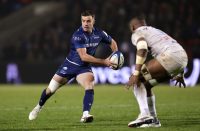 It is the duty of a modern professional sport to use technology to arrive at fair rulings and eliminate errors by officials as far as it possibly can. There is too much riding on the way a sport handles itself in a crowded and competitive arena, with different sports jostling for public attention and television dollars, to leave it all in the hands of three match officials who get a split second view, especially in a game with as many Laws and ‘interpretations’ as Rugby Union.
It is the duty of a modern professional sport to use technology to arrive at fair rulings and eliminate errors by officials as far as it possibly can. There is too much riding on the way a sport handles itself in a crowded and competitive arena, with different sports jostling for public attention and television dollars, to leave it all in the hands of three match officials who get a split second view, especially in a game with as many Laws and ‘interpretations’ as Rugby Union.
With television analysis prevalent now in a way it never was in the 1970s and 80s, there is more pressure on referees than ever before, and if they get big decisions in big matches wrong they are caught in an unforgiving spotlight.
I have been an advocate of the extension of the TMO’s powers to include referrals outside the in-goal area, and will not be changing my tune because of the teething problems encountered on the opening weekend of the Premiership.
We have seen too many high profile instances in which, the television audience – and supporters watching big screens in the ground – are fully aware that a try has been scored from a knock-on, or a player demolished by a late tackle, while the referee and his touch-judges are unaware of what has happened.
Looking like the only idiots in the ground does nothing for the status of the match officials, and that is unacceptable because referees are central to the existence and well-being of our sport.
The argument for the TMO’s brief to be extended was given the final push when a quick but illegal lineout throw by the Wales hooker, Matthew Rees – who took a ball from the nearest ball-boy – saw Mike Phillips score the winning try against Ireland in the 2011 Six Nations. That led the IRB to crank into action, resulting in the current trials in the Premiership and the Currie Cup in South Africa.
 However, not for the first time, the IRB have got their trial wrong, in this instance in two very important ways. The first mistake is taking the referral back to the last stoppage in the game before a try was scored. The process is too convoluted, and is asking for trouble because there will often be multiple phases, with 20 or 30 players passing the ball or competing for it at breakdowns before a try is eventually scored.
However, not for the first time, the IRB have got their trial wrong, in this instance in two very important ways. The first mistake is taking the referral back to the last stoppage in the game before a try was scored. The process is too convoluted, and is asking for trouble because there will often be multiple phases, with 20 or 30 players passing the ball or competing for it at breakdowns before a try is eventually scored.
How the IRB Laws committee did not spot this beggars belief, because the obvious, common sense option is for the referral system to go back only as far as the previous breakdown, or tackle, before a touchdown. Disallowing a try for a knock-on or a forward pass after trawling back through three rucks and 20 passes makes no sense.
Penalising a minor infringement missed by the referee way back in a passage of play goes against natural justice because it fragments a game and destroys its flow – and Tom Varndell’s disallowed try on the stroke of half-time in the Wasps v Harlequins epic at Twickenham last weekend was a case in point with several passages of play after the forward pass.
The only exemption for going back before the previous breakdown should be if one of the officials makes a referral for foul play – like an off-the-ball punch or late tackle taking a player out of the game – which has a direct bearing on a try being scored. If it had no bearing, let the citing/disciplinary system deal with it.
The other serious problem with the extension of the TMO’s powers is that it is no good if you do not invest fully in the technology.
As things stand this trial is half-baked. As highlighted in this column last weekend, the idea that you have one system in place for televised games, and another for non-televised games, means that in terms of the laws there is no level playing field in the Premiership this season. It is also something that could potentially be open to a legal challenge if a club feels they have been disadvantaged by, for instance, having no right of referral.
The only way the TMO system will truly enhance the game is if the technology which is available, including multiple camera angles and infra-red sensors, are on tap with referees and TMOs working as a team. That means, for instance, the referee following his own instincts more, and not having to refer every try that is scored. The process could be improved and faster if the TMO and his assistants supply quick confirmation to the referee that the score is good, or questionable.
The problem with referrals at present is that the lack of cameras and state-of-the-art innovations – such as infra-red sensors and computer imaging which are standard in sports like American Football and cricket – means that rugby TMOs sometimes have little more evidence on which to make their decisions than the referee.
Just because this is a trial does not make it acceptable for the IRB to underfund it, doing it on the cheap through piecemeal coverage and a lack of cutting edge technology.
The TMO system can work well, and enrich Rugby Union for referees, players and supporters – but not if you fail to put in the groundwork in terms of planning and investment.






















